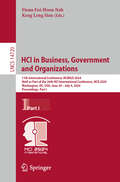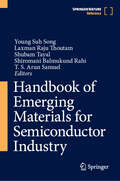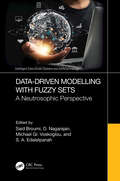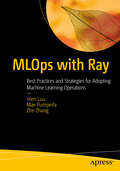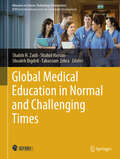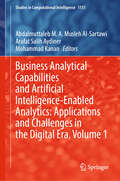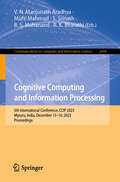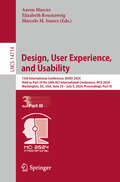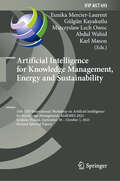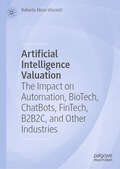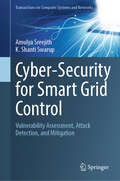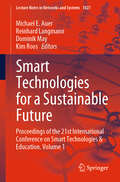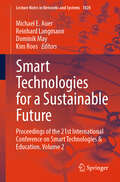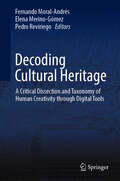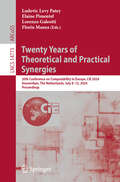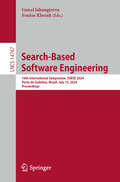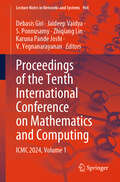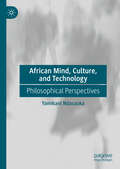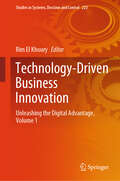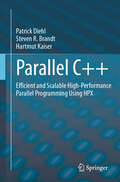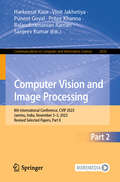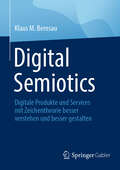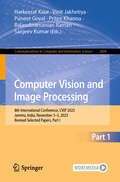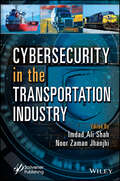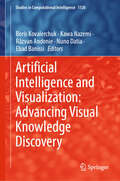- Table View
- List View
HCI in Business, Government and Organizations: 11th International Conference, HCIBGO 2024, Held as Part of the 26th HCI International Conference, HCII 2024, Washington, DC, USA, June 29 – July 4, 2024, Proceedings, Part I (Lecture Notes in Computer Science #14720)
by Fiona Fui-Hoon Nah Keng Leng SiauThis two-volume set of HCIBGO 2024 constitutes the refereed proceedings of the 11h International Conference on HCI in Business, Government and Organizations, held as part of the 26th International Conference, HCI International 2024, which took place in from June 29 - July 4, 2024 in Washington DC, USA. Two volumes of the HCII 2024 proceedings are dedicated to this year’s edition of the HCIBGO conference. The first covers topics related to Digital Commerce and Marketing, Artificial Intelligence in Business, and Workplace, Well-being and Productivity. The second focuses on topics related to Teleworking and Virtual Collaboration, and Improving User Experience and Service Efficiency.
Handbook of Emerging Materials for Semiconductor Industry
by Laxman Raju Thoutam Shiromani Balmukund Rahi Young Suh Song Shubam Tayal T. S. Arun SamuelThe proposed book will be a “one-stop” place for all the young material researchers to understand the recent and reliable material making process, characterization, and reliability test tools. The proposed book is designed to provide basic knowledge to understand and analyse structure-property relationship for reliable emerging material systems for next generation of semiconductor technologies.The book is suggested to engineers and scientists across the world working on various new and novel materials for reliable semiconductor device applications. The book is expected to serve as a reference guide for young scientists and engineers in the field of material science and electronic engineers to acquire latest state-of-art experimental and computational tools to encourage their research activities.Since the scope of the book is generic, the book can be referred by all the students of science and engineering students to create a common awareness about the latest material systems and state-of-art characterization tools that have been broadly utilized to study the physical and chemical properties of different material systems.It introduces the readers to a wide variety of new emerging materials systems including their synthesis, fabrication, measurement, reliability test, modelling and simulations with in-depth analysis of selective applications.This book contains the state-of-art research updates in the various fields of semiconductor, artificial intelligence (AI), bio-sensor, biotechnology, with respect to reliable material research. Therefore, various students who are eager to get a job in semiconductor/AI/Autonomous car/biotechnology are strongly recommended to read this book and learn about related state-of-art knowledge.
Data-Driven Modelling with Fuzzy Sets: A Neutrosophic Perspective (Intelligent Data-Driven Systems and Artificial Intelligence)
by Said Broumi D. Nagarajan Michael Gr. Voskoglou S. A. EdalatpanahFuzzy sets have long been employed to handle imprecise and uncertain information in the real world, but their limitations in dealing with incomplete and inconsistent data led to the emergence of neutrosophic sets. In this thought-provoking book, titled Data-Driven Modelling with Fuzzy Sets: A Neutrosophic Perspective, the authors delve into the theories and extensive applications of neutrosophic sets, ranging from neutrosophic graphs to single-valued trapezoidal neutrosophic sets and their practical implications in knowledge management, including student learning assessment, academic performance evaluation, and technical article screening. This comprehensive resource is intended to benefit mathematicians, physicists, computer experts, engineers, scholars, practitioners, and students seeking to deepen their understanding of neutrosophic sets and their practical applications in diverse fields. This book comprises 11 chapters that provide a thorough examination of neutrosophic set theory and its extensions. Each chapter presents valuable insights into various aspects of data-driven modeling with neutrosophic sets and explores their applications in different domains. The book covers a wide range of topics. The specific topics covered in the book include neutrosophic submodules, applications of neutrosophic sets, solutions to differential equations with neutrosophic uncertainty, cardinalities of neutrosophic sets, neutrosophic cylindrical coordinates, applications to graphs and climatic analysis, neutrosophic differential equation approaches to growth models, neutrosophic aggregation operators for decision making, and similarity measures for Fermatean neutrosophic sets. The diverse contributions from experts in the field, coupled with the constructive feedback from reviewers, ensure the book's high quality and relevance.This book presents a qualitative assessment of big data in the education sector using linguistic quadripartitioned single-valued neutrosophic soft sets showcases application of n-cylindrical fuzzy neutrosophic sets in education using neutrosophic affinity degree and neutrosophic similarity index covers scientific evaluation of student academic performance using single-valued neutrosophic Markov chain illustrates multi-granulation single-valued neutrosophic probabilistic rough sets for teamwork assessment examines estimation of distribution algorithms based on multiple-attribute group decision-making to evaluate teaching quality With its wealth of knowledge, this book aims to inspire further research and innovation in the field of neutrosophic sets and their extensions, providing a valuable resource for scholars, practitioners, and students alike.
MLOps with Ray: Best Practices and Strategies for Adopting Machine Learning Operations
by Max Pumperla Zhe Zhang Hien LuuUnderstand how to use MLOps as an engineering discipline to help with the challenges of bringing machine learning models to production quickly and consistently. This book will help companies worldwide to adopt and incorporate machine learning into their processes and products to improve their competitiveness. The book delves into this engineering discipline's aspects and components and explores best practices and case studies. Adopting MLOps requires a sound strategy, which the book's early chapters cover in detail. The book also discusses the infrastructure and best practices of Feature Engineering, Model Training, Model Serving, and Machine Learning Observability. Ray, the open source project that provides a unified framework and libraries to scale machine learning workload and the Python application, is introduced, and you will see how it fits into the MLOps technical stack. This book is intended for machine learning practitioners, such as machine learning engineers, and data scientists, who wish to help their company by adopting, building maps, and practicing MLOps. What You'll Learn Gain an understanding of the MLOps discipline Know the MLOps technical stack and its components Get familiar with the MLOps adoption strategy Understand feature engineering Who This Book Is For Machine learning practitioners, data scientists, and software engineers who are focusing on building machine learning systems and infrastructure to bring ML models to production
Global Medical Education in Normal and Challenging Times (Advances in Science, Technology & Innovation)
by Shabih H. Zaidi Shahid Hassan Shoaleh Bigdeli Tabassum ZehraThis book is written by several medical educators from developed as well as developing countries based on decades of experience in teaching. The unique experience gained during the COVID-19 pandemic has added new dimensions to the traditional pedagogy, andragogy, and heutagogy, documented here. The salient topics include distance learning, virtual classrooms, virtual workshops on OSCEs, open book exams, micro-learning, micro-credentialing, blended or digitalized curriculum delivery, academic leadership, communication skills, professionalism, telemedicine, bioethics, cyber clinics, artificial intelligence, etc. This book is used as a text or reference book by physicians, teachers, scholars, students, and medical universities for teachers' training, capacity building, and guidance on fundamental pillars of cognitive domains of knowledge, skills, and attitude, as well as factual, conceptual, procedural, and metacognitive skills. It is also a source of guidance in faculty enhancement and toward continued quality improvement in medical education.
Business Analytical Capabilities and Artificial Intelligence-Enabled Analytics: Applications and Challenges in the Digital Era, Volume 1 (Studies in Computational Intelligence #1151)
by Abdalmuttaleb M. A. Musleh Al-Sartawi Arafat Salih Aydiner Mohammad KananThis book explores and discusses how businesses transit from big data and business analytics to artificial intelligence (AI), by examining advanced technologies and embracing challenges such as ethical issues, governance, security, privacy, and interoperability of capabilities. This book covers a range of topics including the application of cyber accounting and strategic objectives, financial inclusion, big data analytics in telecommunication sector, digital marketing strategies and sports brand loyalty, robotic processes automation in banks, and the applications of AI for decision-making in human resources, healthcare, banking, and many more. The book provides a comprehensive reference for scholars, students, managers, entrepreneurs, and policymakers by examining frameworks and business practice implications through its discussions which embrace a wide variety of unique topics on business analytics, AI, and how it can be applied together to address the challenges of the digital era.
Cognitive Computing and Information Processing: 5th International Conference, CCIP 2023, Mysuru, India, December 15–16, 2023, Proceedings (Communications in Computer and Information Science #2044)
by V. N. Manjunath Aradhya Mufti Mahmud S. Srinath B. S. Mahanand R. K. BharathiThis book constitutes the refereed proceedings of the 5th International Conference on Cognitive Computing and Information Processing, CCIP 2023, held in Mysuru, India, in December 2023. The 14 revised full papers presented were carefully reviewed and selected from 127 submissions. The papers are organized in the following topical sections: Communications, Video analytics, Cognitive computing and its applications, and Image analysis.
Design, User Experience, and Usability: 13th International Conference, DUXU 2024, Held as Part of the 26th HCI International Conference, HCII 2024, Washington, DC, USA, June 29 – July 4, 2024, Proceedings, Part III (Lecture Notes in Computer Science #14714)
by Aaron Marcus Marcelo M. Soares Elizabeth RosenzweigThis five-volume set LNCS 14712-14716 constitutes the refereed proceedings of the 13th International Conference on Design, User Experience, and Usability, DUXU 2024, held as part of the 26th International Conference, HCI International 2024, in Washington, DC, USA, during June 29 – July 4, 2024. The total of 1271 papers and 309 posters included in the HCII 2024 proceedings was carefully reviewed and selected from 5108 submissions. The DUXU 2024 proceedings were organized in the following topical sections: Part I: Information Visualization and Interaction Design; Usability Testing and User Experience Evaluation. Part II: Designing Interactions for Intelligent Environments; Automotive Interactions and Smart Mobility Solutions; Speculative Design and Creativity. Part III: User Experience Design for Inclusion and Diversity; Human-Centered Design for Social Impact. Part IV: Designing Immersive Experiences across Contexts; Technology, Design, and Learner Engagement; User Experience in Tangible and Intangible Cultural Heritage. Part V: Innovative Design for Enhanced User Experience; Innovations in Product and Service Design.
Artificial Intelligence for Knowledge Management, Energy and Sustainability: 10th IFIP International Workshop on Artificial Intelligence for Knowledge Management, AI4KMES 2023, Krakow, Poland, September 30–October 1, 2023, Revised Selected Papers (IFIP Advances in Information and Communication Technology #693)
by Eunika Mercier-Laurent Abdul Wahid Gülgün Kayakutlu Mieczyslaw Lech Owoc Karl MasonThis volume IFIP AICT 693 constitutes the refereed proceedings of the 10th IFIP International Workshop on Artificial Intelligence for Knowledge Management, AI4KMES 2023, from September 30th – October 1st, 2023, held in Krakow, Poland. The 15 full papers presented together with 2 short papers were carefully reviewed and selected from 49 submissions. The accepted papers covered a large scope of topics related to sustainability in various contexts such as smart cities, agriculture, energy and gas production and distribution, industry, management and biodiversity.
Artificial Intelligence Valuation: The Impact on Automation, BioTech, ChatBots, FinTech, B2B2C, and Other Industries
by Roberto Moro-ViscontiThe book discusses the main valuation methodologies of artificial intelligence (AI). Company valuation goes hand in hand with estimating intangible assets like AI, which are linked to higher risk and lower collateral value. Their accounting is controversial, and the most widely used valuation approaches are based on market, income, or cost-related metrics.The volume discusses in detail the valuation approaches such as the discounted cash flows (remembering that “cash is king”) or the empirical market multipliers and comparables. The approaches are complemented by several models, including advanced business planning that incorporates machine learning, digital scalability networks, or validating blockchains. The book, with a tailor-made theoretical background backed by empirical cases, shows how to evaluate AI products, such as chatbots or virtual assistants, for AI established producers, startups, or traditional “brick-and-mortar” AI users. The comprehensive set of techniques and methodologies will interest researchers, students, and practitioners in corporate finance, intellectual property valuation, and financial technology.
Cyber-Security for Smart Grid Control: Vulnerability Assessment, Attack Detection, and Mitigation (Transactions on Computer Systems and Networks)
by K. Shanti Swarup Amulya SreejithThe book focuses on a very important area of Smart Grids - cyber security. It deals in particular with the tools and techniques for cyber security analysis of the Smart Grid control systems. This includes the standards and guidelines, detailed vulnerability assessment framework, attack detection strategies, and attack mitigation methods. The book is divided into three parts. The smart grid cyber-physical system is discussed in the first part. The second part introduces the attacks in the grid system and a vulnerability assessment framework followed by a tool that can be used to analyze the grid control systems using existing cyber security standards. In the third part, different forms of attack detection methods are discussed along with Python-based implementations for the same. The book also discusses attack mitigation methods with implementation. Detailed illustrations and tables are provided in each section. The book also includes case studies based on standard test systems thushelping students to implement the discussed methods. The case studies are based on MATLAB and Python implementations thus catering to a wide range of audiences. Outputs and screenshots of the tools and programs are included so students can compare their results and improve upon the discussed methods. The book will be useful to a wide variety of audiences such as students and researchers in Smart Grids, power system operators, and device manufacturers.
Smart Technologies for a Sustainable Future: Proceedings of the 21st International Conference on Smart Technologies & Education. Volume 1 (Lecture Notes in Networks and Systems #1027)
by Michael E. Auer Reinhard Langmann Dominik May Kim RoosThis book includes the proceedings of the 21st International Conference on Smart Technologies & Education (STE2024). The “International Conference on Smart Technologies & Education” (STE) is an annual global meeting dedicated to the fundamentals, applications, and experiences in the field of Smart Technologies, Online, Remote, and Virtual Engineering, Virtual Instrumentation, and other related new technologies. Nowadays, online and smart technologies are the core of most fields of engineering and the whole society. Consequently, the motto of this year’s STE2024 was “Smart Technologies for a Sustainable Future”. The STE conference is the successor of the long-standing annual REV Conferences and the annual meeting of the International Association of Online Engineering (IAOE) together with the EduNet World Association (EWA) and the International Education Network (EduNet). In a globally connected world, the interest in online collaboration, teleworking, remote services, and other digital working environments is rapidly increasing. In response to that, the general objective of this conference is to contribute and discuss fundamentals, applications, and experiences in the field of Online and Remote Engineering, Virtual Instrumentation, and other related new technologies like Cross Reality, Open Science and Big Data, Internet of Things and Industrial Internet of Things, Industry 4.0, Cyber Security, and M2M and Smart Objects. Another objective of the conference is to discuss guidelines and new concepts for engineering education in higher and vocational education institutions, including emerging technologies in learning, MOOCs and MOOLs, and Open Resources. This year, STE2024 has been organized in Helsinki, Finland as an onsite event supporting remote presentations, from March 6 until March 8, 2024. The co-organizers of STE2024 were the Arcada University of Applied Sciences, the International Association of Online Engineering (IAOE) together with the Global Online Laboratory Consortium (GOLC), the International Education Network (EduNet), and the EduNet World Association (EWA). STE2024 has attracted 140 scientists and industrial leaders from more than 40 countries.
Smart Technologies for a Sustainable Future: Proceedings of the 21st International Conference on Smart Technologies & Education. Volume 2 (Lecture Notes in Networks and Systems #1028)
by Michael E. Auer Reinhard Langmann Dominik May Kim RoosThis book includes the proceedings of the 21st International Conference on Smart Technologies & Education (STE2024). The “International Conference on Smart Technologies & Education” (STE) is an annual global meeting dedicated to the fundamentals, applications, and experiences in the field of Smart Technologies, Online, Remote, and Virtual Engineering, Virtual Instrumentation, and other related new technologies. Nowadays, online and smart technologies are the core of most fields of engineering and the whole society. Consequently, the motto of this year’s STE2024 was “Smart Technologies for a Sustainable Future”. The STE conference is the successor of the long-standing annual REV Conferences and the annual meeting of the International Association of Online Engineering (IAOE) together with the EduNet World Association (EWA) and the International Education Network (EduNet). In a globally connected world, the interest in online collaboration, teleworking, remote services, and other digital working environments is rapidly increasing. In response to that, the general objective of this conference is to contribute and discuss fundamentals, applications, and experiences in the field of Online and Remote Engineering, Virtual Instrumentation, and other related new technologies like Cross Reality, Open Science and Big Data, Internet of Things and Industrial Internet of Things, Industry 4.0, Cyber Security, and M2M and Smart Objects. Another objective of the conference is to discuss guidelines and new concepts for engineering education in higher and vocational education institutions, including emerging technologies in learning, MOOCs and MOOLs, and Open Resources. This year, STE2024 has been organized in Helsinki, Finland as an onsite event supporting remote presentations, from March 6 until March 8, 2024. The co-organizers of STE2024 were the Arcada University of Applied Sciences, the International Association of Online Engineering (IAOE) together with the Global Online Laboratory Consortium (GOLC), the International Education Network (EduNet), and the EduNet World Association (EWA). STE2024 has attracted 140 scientists and industrial leaders from more than 40 countries.
Decoding Cultural Heritage: A Critical Dissection and Taxonomy of Human Creativity through Digital Tools
by Fernando Moral-Andrés Elena Merino-Gómez Pedro ReviriegoThis book provides readers with an overview of the use of digital techniques for cultural heritage preservation. Those include image processing, advanced sensing, geomatics or virtual and augmented reality. The use of newer tools such as generative artificial intelligence for images and 3D or advanced natural language processing systems is also considered. The ultimate goal is to provide readers with a global perspective of the state of the art on the use of digital tools for cultural heritage applications, both for researchers and professionals involved in cultural heritage and for computer scientists and engineers that design and develop technologies that can be used for cultural heritage preservation.
Twenty Years of Theoretical and Practical Synergies: 20th Conference on Computability in Europe, CiE 2024, Amsterdam, The Netherlands, July 8–12, 2024, Proceedings (Lecture Notes in Computer Science #14773)
by Florin Manea Elaine Pimentel Ludovic Levy Patey Lorenzo GaleottiThis book constitutes the refereed proceedings of the 20th Conference on Computabilitty in Europe, CiE 2024, held in Amsterdam, The Netherlands, during July 8–12, 2024 The 26 full papers and 2 short papers included in this book were carefully reviewed and selected from 43 submissions. This CIE 2024 focus on development of computability-related science, ranging over mathematics, computer science and applications in various natural and engineering sciences.
Search-Based Software Engineering: 16th International Symposium, SSBSE 2024, Porto de Galinhas, Brazil, July 15, 2024, Proceedings (Lecture Notes in Computer Science #14767)
by Foutse Khomh Gunel JahangirovaThis book constitutes the refereed proceedings of the 16th International Symposium on Search-Based Software Engineering, SSBSE 2024, held in Porto de Galinhas, Brazil, during July 2024. The 8 papers included in these proceedings were carefully reviewed and selected from 19 submissions. The papers deal with various aspects and applications of search-based software engineering, focusing on engineering challenges and the application of automated approaches and optimization techniques from AI and machine learning research.
Proceedings of the Tenth International Conference on Mathematics and Computing: ICMC 2024, Volume 1 (Lecture Notes in Networks and Systems #964)
by S. Ponnusamy Debasis Giri Jaideep Vaidya Zhiqiang Lin Karuna Pande Joshi V. YegnanarayananThis book features selected papers from the 10th International Conference on Mathematics and Computing (ICMC 2024), held at Kalasalingam Academy of Research and Education (KARE), Krishnankoil, India during 2 – 7 January 2024. It covers recent advances in the field of mathematics, statistics, and scientific computing. The book presents innovative work by leading academics, researchers, and experts from industry in mathematics, statistics, cryptography, network security, cyber security, machine learning, data analytics and blockchain technology in computer science and information technology. The book is divided into two volumes.
African Mind, Culture, and Technology: Philosophical Perspectives
by Yamikani NdasaukaThis book provides a philosophical investigation of technology in Africa, articulating conceptual foundations and analyses rooted in African worldviews and communitarian values. It aims to spur discourse and understanding of how technology can be justly shaped for human advancement in Africa. Yamikani Ndasauka highlights the need to understand African conceptions of existence, ethics, and values as foundations for envisioning more humanistic technological applications. A historical contextualisation traces the layered origins of African technology philosophy in indigenous innovation, resistant adaptation of external systems, and creative fusion of endogenous and exogenous knowledge. The book develops African frameworks to assess and design technology in accord with human dignity and collective advancement.
Technology-Driven Business Innovation: Unleashing the Digital Advantage, Volume 1 (Studies in Systems, Decision and Control #223)
by Rim El KhouryThis book aims to provide a comprehensive understanding of the interplay between technology and business and its implications for future growth and innovation. In today's rapidly changing world, technology plays a crucial role in shaping the business landscape. Advancements in artificial intelligence, blockchain, data analytics, and automation have revolutionized how organizations operate, compete, and achieve success. Understanding the profound impact of technology on business is vital for entrepreneurs, managers, policymakers, and academics alike. This book aims to explore the connection between technology and business, highlighting its importance in driving transformative changes across various industries. We welcome scholars, researchers, and practitioners to share their expertise and insights in this exciting endeavor.This book captures the essence of exploring the dynamic relationship between technology and business, emphasizing the potential for innovation and growth. It conveys the idea of embracing the transformative power of technology within the business realm and the opportunities it presents for unleashing new ideas and strategies.By delving into various aspects such as emerging technologies, business strategies, innovation, and ethical considerations, it aims to provide a comprehensive understanding of the symbiotic relationship between technology and business. It offers insights into the integration of technology into decision-making processes, the transformative impact on different industries, and strategies for leveraging technology to drive organizational growth and sustainability.Furthermore, the book highlights real-world case studies, explores emerging trends, and discusses the ethical and social implications of technology adoption in the business context. It serves as a valuable resource for entrepreneurs, managers, policymakers, academics, and anyone interested in understanding and harnessing the potential of technology for business success. This book aims to be a valuable resource for individuals interested in the transformative power of technology in the business realm. By compiling a collection of insightful chapters, it offers readers a diverse range of perspectives, frameworks, and case studies that shed light on the complexities and opportunities associated with technology-driven business environments.
Parallel C++: Efficient and Scalable High-Performance Parallel Programming Using HPX
by Patrick Diehl Hartmut Kaiser Steven R. BrandtThis textbook focuses on practical parallel C++ programming at the graduate student level. In particular, it shows the APIs and related language features in the C++ 17 and C++ 20 standards, covering both single node and distributed systems. It shows that with the parallel features in the C++ 17 and C++ 20 standards, learning meta-languages like OpenMP is no longer necessary. Using the C++ standard library for parallelism and concurrency (HPX), the same language features can be extended to distributed codes, providing a higher-level C++ interface to distributed programming than the Message Passing Interface (MPI). The book starts with the single-threaded implementation of the fractal sets, e.g. Julia set, and Mandelbrot set, using the C++ Standard Library (SL)’s container and algorithms. This code base is used for parallel implementation using low-level threads, asynchronous programming, parallel algorithms, and coroutines. The asynchronous programming examples are then extended to distributed programming using the C++ standard library for parallelism and concurrency (HPX). Octo-Tiger, an astrophysics code for stellar merger, is used as a showcase for a portable, efficient, and scalable high-performance application using HPX. The book’s core audience is advanced undergraduate and graduate students who want to learn the basics of parallel and distributed C++ programming but are not computer science majors. Basic C++ knowledge, like functions, classes, loops, and conditional statements, is assumed as a requirement, while C++ advanced topics, like generic programming, lambda functions, smart pointers, and move semantics, are briefly summarized in the appendix.
Computer Vision and Image Processing: 8th International Conference, CVIP 2023, Jammu, India, November 3–5, 2023, Revised Selected Papers, Part II (Communications in Computer and Information Science #2010)
by Sanjeev Kumar Balasubramanian Raman Pritee Khanna Puneet Goyal Harkeerat Kaur Vinit JakhetiyaThe three-volume set CCIS 2009, 2010 and 2011 constitutes the refereed post-conference proceedings of the 8th International Conference on Computer Vision and Image Processing, CVIP 2023, held in Jammu, India, during November 3–5, 2023. The 140 revised full papers presented in these proceedings were carefully reviewed and selected from 461 submissions. The papers focus on various important and emerging topics in image processing, computer vision applications, deep learning, and machine learning techniques in the domain.
Digital Semiotics: Digitale Produkte und Services mit Zeichentheorie besser verstehen und besser gestalten
by Klaus M. BernsauDieses Buch erklärt, wie Unternehmen mit Hilfe der Semiotik – der Lehre von den Zeichen – ihre digitalen Produkte und Dienstleistungen erfolgreicher machen können. Denn die Wellness-App, der Warenkorb im Onlineshop oder der Like-Button in der Produktansicht haben eines gemeinsam: Sie basieren auf digitalen Zeichen. Diese kundengerecht einzusetzen, wird immer mehr zum Schlüssel für das Produkterlebnis und damit zur Voraussetzung für den Produkterfolg. Die moderne Semiotik verbindet Sprachwissenschaft, Erkenntnistheorie, Anthropologie, Psychologie und Sozialwissenschaften zu einem faszinierenden Blick auf digitale Angebote. Der Autor zeigt, wie Unternehmen diese Erkenntnisse nutzen können und liefert ein praxisnahes Buch für Produktmanager*innen, Marketer*innen, Kommunikator*innen, Designer*innen, Softwareentwickler*innen – kurz: für alle, die für digitale Produkte und Dienstleistungen verantwortlich sind.
Computer Vision and Image Processing: 8th International Conference, CVIP 2023, Jammu, India, November 3–5, 2023, Revised Selected Papers, Part I (Communications in Computer and Information Science #2009)
by Sanjeev Kumar Balasubramanian Raman Pritee Khanna Puneet Goyal Harkeerat Kaur Vinit JakhetiyaThe three-volume set CCIS 2009, 2010 and 2011 constitutes the refereed post-conference proceedings of the 8th International Conference on Computer Vision and Image Processing, CVIP 2023, held in Jammu, India, during November 3–5, 2023. The 140 revised full papers presented in these proceedings were carefully reviewed and selected from 461 submissions. The papers focus on various important and emerging topics in image processing, computer vision applications, deep learning, and machine learning techniques in the domain.
Cybersecurity in the Transportation Industry
by Noor Zaman Jhanjhi Imdad Ali ShahThis book offers crucial solutions and insights on how transportation companies can enhance their cybersecurity management and protect their corporate reputation and revenue from the increasing risk of cyberattacks. The movement of people and goods from one location to another has always been essential to human development and survival. People are now exploring new methods of carrying goods. Transportation infrastructure is critical to the growth of a global community that is more united and connected. The presented cybersecurity framework is an example of a risk-based method for managing cybersecurity risk. An organisation can find opportunities to strengthen and explain its management of cybersecurity risk by using its existing procedures and leveraging the framework. The framework can provide a foundation for businesses that do not currently have a formal cybersecurity program. However, there is a strong temptation to give in when a transportation company is facing a loss of millions of dollars and the disruption of the worldwide supply chain. Automobile production, sales, trucking, and shipping are high-value industries for transportation enterprises. Scammers know that these corporations stand to lose much more in terms of corporate revenue and reputation than even the highest ransom demands, making them appealing targets for their schemes. This book will address the increasing risk of cyberattacks and offer solutions and insight on the safety and security of passengers, cargo, and transportation infrastructure to enhance the security concepts of communication systems and the dynamic vendor ecosystem.
Artificial Intelligence and Visualization: Advancing Visual Knowledge Discovery (Studies in Computational Intelligence #1126)
by Ebad Banissi Kawa Nazemi Boris Kovalerchuk Răzvan Andonie Nuno DatiaThis book continues a series of Springer publications devoted to the emerging field of Integrated Artificial Intelligence and Machine Learning with Visual Knowledge Discovery and Visual Analytics that combine advances in both fields. Artificial Intelligence and Machine Learning face long-standing challenges of explainability and interpretability that underpin trust. Such attributes are fundamental to both decision-making and knowledge discovery. Models are approximations and, at best, interpretations of reality that are transposed to algorithmic form. A visual explanation paradigm is critically important to address such challenges, as current studies demonstrate in salience analysis in deep learning for images and texts. Visualization means are generally effective for discovering and explaining high-dimensional patterns in all high-dimensional data, while preserving data properties and relations in visualizations is challenging. Recent developments, such as in General Line Coordinates, open new opportunities to address such challenges.This book contains extended papers presented in 2021 and 2022 at the International Conference on Information Visualization (IV) on AI and Visual Analytics, with 18 chapters from international collaborators. The book builds on the previous volume, published in 2022 in the Studies in Computational Intelligence. The current book focuses on the following themes: knowledge discovery with lossless visualizations, AI/ML through visual knowledge discovery with visual analytics case studies application, and visual knowledge discovery in text mining and natural language processing. The intended audience for this collection includes but is not limited to developers of emerging AI/machine learning and visualization applications, scientists, practitioners, and research students. It has multiple examples of the current integration of AI/machine learning and visualization for visual knowledge discovery, visual analytics, and text and natural language processing. The book provides case examples for future directions in this domain. New researchers find inspiration to join the profession of the field of AI/machine learning through a visualization lens.
